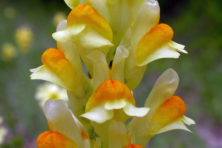June, The Moon of Weeds
- Share
- Tweet
- Pin
- Share
June, the month, should be renamed “Weed” to better understand its place in the realm of the farm summer. According to farm cosmology weeds come in two forms: noxious and evil. Perhaps it is only the farm child who wonders why weeds are so superlative at what they do. Weeds come unbidden, they are not sown, watered or fertilized yet the unguarded field they infiltrate and soon after reign noisy and supreme. And what a list of champions: pigweed, quackgrass, lambsquarter, black nightshade, hairy nightshade, velvetleaf, foxtail, the giant foxtail, water hemp, curly dock, thistle, yellow rocket. Some say for the perspective of history it was the bad farm economy that drove from the land what was once 70 percent farmers, to wonder perhaps if it was the weeds?
There are many modern citizens whose blood boils, whose skin crawls, whose brain cells rebel at the mention of that demon-scented word “herbicide.” Synonymous as it is with “toxic,” “poisonous,” “lethal,” “death,” “chemical;” all these bad, horrible, mean words bottled up in a jug of 2.4.D, Atrazine, metolachlor. Naughty words whose one further synonym is “hoe handle.” Was the hoe and the two-row cultivator what killed off Jefferson’s dream of an America of farmers?
To farm in the latter half of the 20th century was to witness the birth and rise of chemical weed control, herbicides. The marvel of 2-4-D amine, of atrazine, of glyphosate, most of which are hormones, but were they an animal host we would call pharmaceuticals, fungicides being just wholesale quantities of athlete’s foot powder. Was it a clinical botanist who figured out you could kill grasses with stuff that spared broad leaf plants, and with a little magical chemistry do the reverse, keep the grasses and kill the broad-leafs? Amazing thing that chemistry.
Michael Pollan is a wonderfully literate and modest critic of modern agriculture, if occasionally a tad racist in his attitude toward chemistry, reviling as he does “chemical agriculture.” Which is a fair enough accusation if one is willing also to revile “chemical medicine.” As for “monoculture” that is pretty much the definition of what a field is, and civilization for the last 10,000 years. Corn, wheat, rice, potatoes, manioc, cassava, those are pretty much it, the standard ingredients of human agriculture. Add milk, cheese, eggs, chicken and hogs and we have contrived to run a planet of seven billions quite nicely, a monoculture because that is how the socialized field works. Not to be confused with the deck of cards available to the kitchen garden. That joyous creation, that abiding pleasure but in no way fuels seven billion people who don’t want to devote a couple hours every day to a hoe handle, never mind it would do a lot of those seven billion a world of good.
To propose that it’s time for the mental construct of decent and thoughtful persons to forgive the words “chemical” and “monoculture.” Organic has its virtues, it is also to turn your moral back on a good share of those fellow seven billions, most of whom are inescapably urban and would perish without voluminous monoculture. As a personal philosophy it is comforting to tend a garden “the old way,” to send children to pick off Colorado potato beetles though a portable vacuum cleaner works nicely. As for the field, we long ago found out there aren’t children enough.
The potato acreage in Portage County is the same as a century ago, since then 97 percent of them have gone to town.
When I was a farm kid on the first day of June we hitched up the corn cultivator to the Allis Chalmers’ narrow-front. The frame of this Allis like the frame of every other tractor made came predrilled with holes to fit any of several versions of cultivators. When attached to the tractor with the shields fitted it began its long sentry duty, guarding the fields against the invasive legions of weeds. Forward speed something on the order of 1.5 miles per hour.
Field after field, then to do it all over again, salvo after salvo of cultivation until the corn was that judgmental knee high at which point the crop was on its own as far as weeds are concerned. The arrival of the Fourth of July and Independence Day meant something else to participants who had for the month previous spent every waking hour cultivating at 1.5 miles per hour. Neatly coincident to the speed of the common dust cloud. There were farm kids who left the farm and never came back because of that dust cloud, to become teachers and lawyers and paper makers because of 1.5 miles per hour, that battle against weeds was never won, just fought again.

